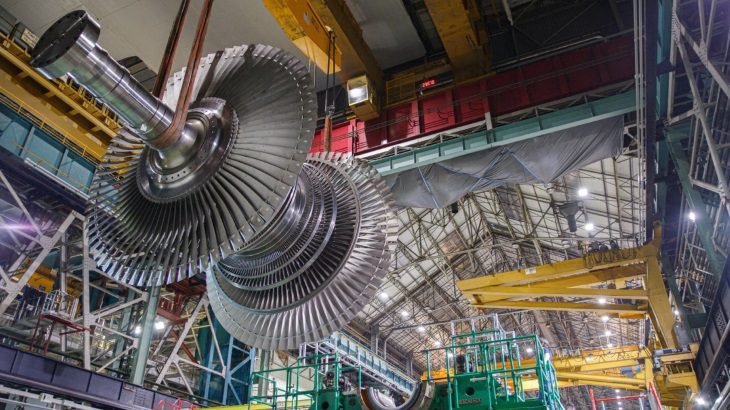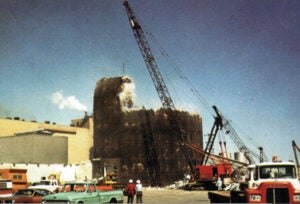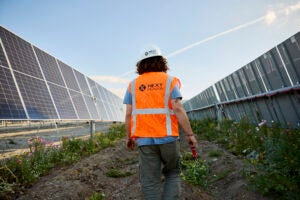GE has signed an exclusive agreement with EDF Group, an entity majority held by the French government, to sell the equipment segment and some services that make up Steam Power’s nuclear-serving steam turbine business—part of a portfolio that GE adopted during its 2015 merger with French equipment giant Alstom.
The American technology conglomerate confirmed it signed a non-binding memorandum of understanding for the proposed transaction on Feb. 10, though the French government has publicly acknowledged talks for EDF’s acquisition of the lucrative segment for weeks.
While financial terms of the proposed transaction were not disclosed, GE said the deal could close in the first half of 2023, “subject to consultation with employee representatives and other customary closing conditions, including regulatory requirements.” However, in an 8-K filing with the U.S. Securities and Exchange Commission on Thursday, GE disclosed it expects to take a “non-cash, pretax impairment charge” of about $700 million to $800 million related to the remaining Steam Power business’s intangible and fixed assets.
Another Major Shift for GE
GE told POWER on Thursday that after the sale, it envisions Steam Power will retain a services-centered business focused on the more than 100 GW of nuclear turbine islands in the Americas region. GE will also retain GE Hitachi Nuclear Energy (GEH), a 2007-established alliance between GE and technology conglomerate Hitachi that recently bagged its first small modular nuclear (SMR) deal with Ontario Power Generation.
The move is especially noteworthy given GE’s dramatic announcement last November to combine and spin-off its Renewable Energy, Power, and Digital business. As a segment under GE’s Power division, GE Steam Power’s steam turbine technology already operates in 50% of the world’s nuclear power plants, producing 200 GW for the global grid.
In September 2020, the business group announced it would exit the new-build coal power market. And last year, it highlighted a concerted role for its Steam Power business to bolster nuclear’s contribution to the climate fight, forecasting a notably optimistic yearly demand of 10 GW in the new nuclear market over the coming decade. In January, GE reported an uptick in orders across equipment and services at Steam Power, driven by the nuclear part of its business, though the segment suffered lower revenues owing to “fewer shipments, reduced turnkey scope of Gas, and Steam’s continued exit of new-build coal.”
“Outside of this transaction, we continue to see great potential for growth in our own GE Hitachi, a leading lifecycle provider for reactor islands which will deploy Canada’s first commercial, grid-scale SMR,” a GE spokesperson told POWER when asked why GE agreed to the deal. “GE remains committed to the nuclear sector and continues to invest in next-generation technology which will play an important role in today’s energy transition.”
Up for Sale: Arabelle, Maintenance and Upgrades for Existing Nuclear Plants
The proposed transaction includes GE Steam Power’s conventional island equipment for new nuclear power plants, including Arabelle technology, pump and heat exchanger activity, as well as services in all regions except for the Americas. Arabelle turbines are notably GE Steam Power’s flagship steam turbine platform. Capable of accomodating power outputs from 700 MW to 1.9 GW, they are currently the largest turbines in operation worldwide.“The transaction would also include steam turbine technology for future nuclear plants, like the next generation of European pressurized reactors (EPR2) and small modular reactors (SMR),” GE said.

GE has also proposed to sell Steam Power’s maintenance and upgrades for existing nuclear power plants. If the deal is finalized, Steam Power will continue operations as a services-oriented business to “support the installed base of coal plants as well as nuclear turbine islands in the Americas,” a spokesperson said.
The nuclear activities and teams affected by the proposed transaction are based in about fifteen countries, with nearly 70% of the workforce in France, including at GE Steam Power manufacturing sites like Belfort and La Courneuve, GE confirmed.
A French ‘Triumph’
The proposed acquisition would add yet another segment to EDF Group, the giant holding company that is 83% owned by the French state. Along with a major stake in France’s generation and supply activities, EDF Group owns assets in the UK, Italy, and China. EDF, notably, also holds a 75.5% ownership stake in Framatome, a formidable global nuclear equipment and fuels entity that designs and supplies nuclear steam supply system and nuclear equipment.
EDF Chairman and CEO Jean-Bernard Lévy on Thursday hailed the proposed deal, suggesting the plan to acquire part of GE Steam Power’s nuclear activities—including the Arabelle turbine—“will enable EDF to strengthen its key technologies and skills for the nuclear fleet in operation and for new nuclear projects in France and worldwide.”
French media speculated more details about the deal could emerge as President Emmanuel Macron makes a renewed push for a nuclear expansion, as expected on Thursday. During media appearances this week, French government officials, notably, have painted the prospective deal as a positive development for France that signifies a “return” of the turbine business to France amid the country’s renewed push for decarbonization.
EDF has explored an acquisition of GE Steam Power’s nuclear activities in France at least since last September when French Finance Minister Bruno Le Maire first acknowledged talks. French media have speculated a deal could affect 2,500 GE employees based in the Belfort region in eastern France, the industrial basin that hosts a key manufacturing and assembly hub for GE’s Steam segment.
France’s Minister of the Ecological Transition Barbara Pompili during an interview with French television station FranceInfo on Feb. 8 said the French government views the acquisition as “good news,” because it allows France to “recover” nuclear skills related to turbine manufacturing. Asked why the acquisition was necessary, given that Macron had backed Alstom’s power business sale to GE in 2015, Pompili said it was timely.
In 2015, France had not yet embarked on its decarbonization push under the Paris Agreement, and Alstom’s restructuring was then necessary so the company could refocus on growing its transportation segment, she said. Today, Alstom is a profitable mobility solutions entity with 71,000 employees in 70 countries, she noted. Pompili also suggested an acquisition would be beneficial for industrial jobs in Belfort, especially in light of France’s ambitions to become carbon neutral in 2050.
France, which is slated to wrap up its first of two five-year plans in 2023 under its multi-annual energy plan (MAEP), envisages a significant increase in annual renewable generation from 109 TWh to 300 TWh in 10 years, efforts it anticipates will help it meet a legally established target to reduce the share of nuclear in its electricity generation profile from the current 70% to 50% by 2035.
At the same time, the country is developing an industrial strategy for replacing existing nuclear generators when they reach the end of their lifetimes. France’s currently operating reactor fleet is on average 35 years old. An estimated 27 out of its 58 reactors are scheduled to reach the 40-year threshold over the next five years.
EDF is spearheading a major industrial program to extend the lifetime of these reactors past 40 years, but efforts are subject to case-by-case assessment and approval by the independent Nuclear Safety Agency. Broadly, however, industry observers suggest that France’s current generators may not be operated for more than 60 years. The vast majority could be decommissioned between 2030 and 2050.
—Sonal Patel is a POWER senior associate editor (@sonalcpatel, @POWERmagazine).










